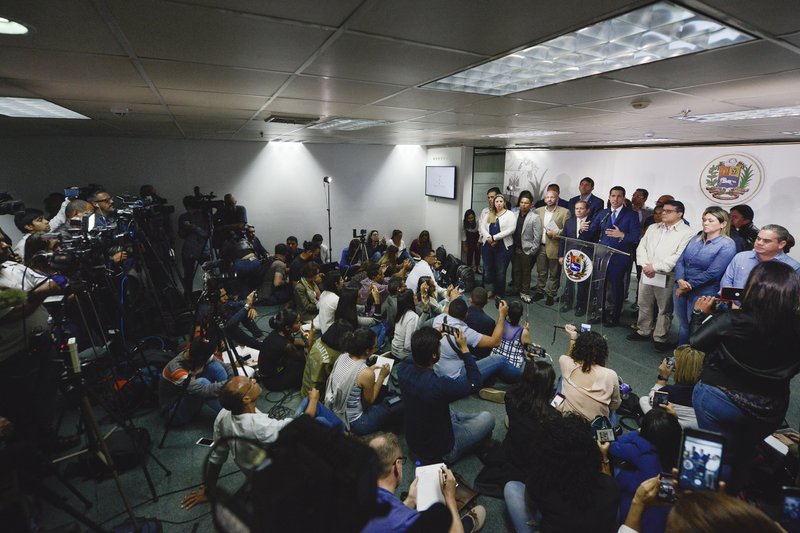CARACAS, Venezuela -- The would-be new leader of Venezuela's congress dug in Monday against accusations that he facilitated a takeover of the country's last democratic institution by socialist allies of President Nicolas Maduro.
Luis Parra insisted that parliamentary rules were followed when he was elected head of the National Assembly on Sunday in a session in which security forces loyal to Maduro blocked opposition leader Juan Guaido from attending.
Parra, a previously unknown backbencher mired in accusations of bribe-taking, said the 150 lawmakers in attendance more than satisfied the quorum requirements in the 167-seat legislature. He said 81 of those present voted for him, including 30 members of the opposition, in a stunning rebuke of Guaido, who had expected to win reelection easily.
But in rambling comments to journalists who challenged his every assertion, Parra acknowledged he didn't know who exactly had voted for him during the chaotic session, in which a handful of socialist lawmakers stormed the dais in a rushed show of hands. Nor could he square the apparent results with the 100 lawmakers who elected Guaido in a roll call vote held later in the day at an emergency session at a Caracas newspaper.
"We're seeking the list," he said, insisting the tally would be provided in the coming hours.
The rival claims to the legislature's mantle have plunged the South American nation into crisis once again, setting the stage for another battle for institutional power.
[Video not showing up above? Click here to watch » https://www.youtube.com/watch?v=WYaLts1VAsM]
While Guaido enjoys the full support of the U.S., and even leftist governments like Argentina and Mexico condemned the government's actions, there's no indication that Maduro's grip on power -- especially the armed forces -- is weakening. Nor do analysts expect mass protests like the ones that a year ago accompanied Guaido's bold challenge to Maduro to resume anytime soon.
"Without protests or control of parliament, Guaido has little bargaining power," said Phil Gunson, a Caracas-based analyst for the International Crisis Group.
Parra, in a news conference from the floor of the legislature, tried to project an image of independence, saying he never had been nor would ever be a Chavista -- as supporters of the late leader Hugo Chavez are known. But while blasting Maduro for the oil-rich nation's collapse, he also took repeated aim at Guaido, saying he had put his own political ambitions ahead of Venezuelans' urgent needs.
"The two extremes aren't good for the country," he said.
As the head of congress, he said he would focus on practical initiatives aimed at improving the quality of life for Venezuelans beset by hyperinflation, power outages and widespread food and medicine shortages.
However, Elliott Abrams, the U.S. State Department's special envoy for Venezuela, said far from outmaneuvering Guaido, the government took a serious gamble in sending out the military to prevent his reelection.
[Gallery not loading above? Click here for more photos » arkansasonline.com/17venezuela/]
"This was something the regime didn't want to do," Abrams said in a news conference from Washington. "I don't think they come out yesterday stronger, but weaker."
He praised opposition lawmakers, several of whom had been in hiding from prosecution and reemerged to vote for Guaido in what he called an "extraordinary"' demonstration of "courage and unity."
In a statement, Russia's foreign ministry said Parra's election was the result of a "legitimate democratic procedure."
A year ago, Guaido asserted at a street demonstration that his position as legislative leader made him Venezuela's interim president in place of the "usurper" Maduro, whose 2018 reelection has been rejected by the U.S., European Union and several Latin American governments. Key opposition figures were barred from running in that election.
The weeks leading up to Sunday's vote were marked by tension, with the opposition alleging a covert government campaign to intimidate and bribe lawmakers into voting against Guaido.
A Section on 01/07/2020
